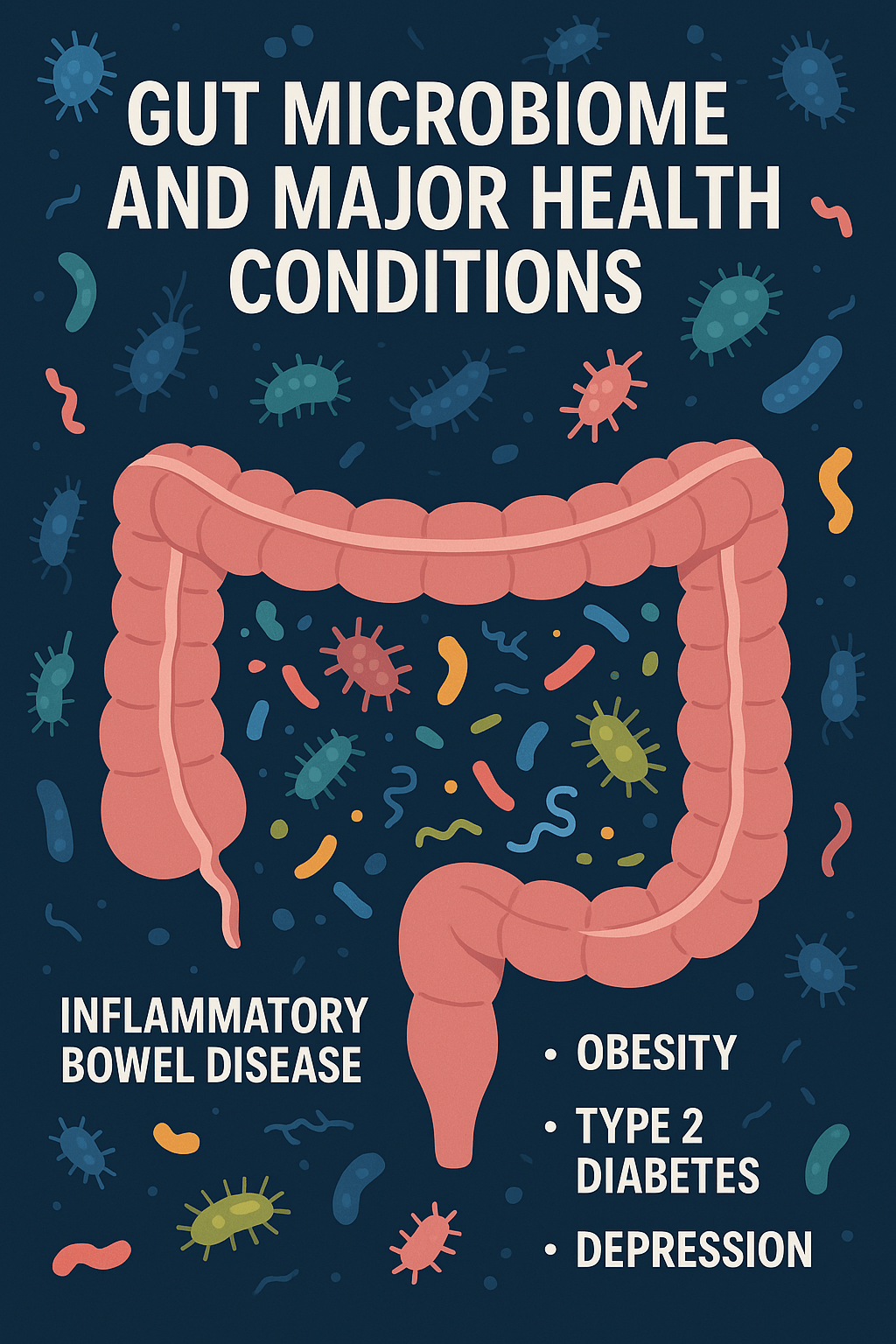
Nine scientific publications that proved a causal relationship between the gut microbiome and specific medical indications
Explore groundbreaking scientific studies that move beyond correlation to establish causal links between the gut microbiome and major health conditions like IBD, obesity, depression, and more—spanning both human and animal research.
Introduction
The gut microbiome—a complex community of microorganisms residing in the digestive tract—has garnered significant attention for its role in various health conditions. Understanding the causal relationships between specific microbial compositions and medical indications is crucial for developing targeted therapeutic strategies. This article delves into several pivotal studies that have established cause-and-effect links between the gut microbiome and specific diseases, encompassing both human and animal research. Each section summarizes the objective, methodology, and findings of these studies, providing insights into how alterations in the gut microbiome can influence health outcomes.
Over the past decade, research on the gut microbiome has exploded, uncovering a vast array of correlations between microbial populations and various human diseases. These correlation studies have been instrumental in identifying potential links between dysbiosis—the imbalance of gut bacteria—and conditions such as obesity, diabetes, autoimmune disorders, and mental health issues. However, correlation does not imply causation. Only recently have researchers begun to rigorously pursue and publish studies that move beyond association to establish cause-and-effect relationships. These studies utilize advanced methods, including fecal microbiota transplantation, germ-free animal models, and Mendelian randomization analyses, to demonstrate that the gut microbiome can directly influence disease outcomes. In this article, we explore a selection of pioneering studies that have successfully demonstrated causal relationships between the gut microbiome and specific medical indications, spanning both human and animal research.

Study 1: Gut Microbiota and Inflammatory Bowel Disease (IBD)
Objective: To investigate the causal relationship between gut microbiota composition and the development of Inflammatory Bowel Disease (IBD).
Methodology: Researchers conducted a comprehensive review of existing literature, focusing on studies that examined the differences in gut microbiota between IBD patients and healthy individuals. They analyzed data from various human and animal studies to identify specific bacterial species associated with IBD.
Findings: The analysis revealed that IBD patients exhibit a distinct gut microbiota composition compared to healthy individuals. Notably, there is a decrease in beneficial bacteria such as Bifidobacterium longum, Eubacterium rectale, Faecalibacterium prausnitzii, and Roseburia intestinalis, and an increase in potentially harmful species like Bacteroides fragilis and Ruminococcus torques. These alterations suggest that dysbiosis may play a role in the pathogenesis of IBD. However, the review also highlighted that a direct causal relationship between dysbiosis and IBD has not been definitively established in humans, indicating the need for further research.Wikipedia, Wikipedia, PubMed
Link to Report: Gut microbiota and IBD: causation or correlation?
Study 2: Gut Microbiome and Obesity
Objective: To explore the potential causal role of the gut microbiome in the development of obesity.PubMed, PMC
Methodology: This study reviewed existing research on the association between gut microbiota composition and obesity in both human and animal models. The researchers examined evidence supporting the hypothesis that alterations in the gut microbiome contribute to obesity.
Findings: The review found that the gut microbiota has been linked with chronic diseases such as obesity in humans. However, demonstrating causality between specific constituents of the microbiota and obesity remains challenging. The authors suggest using Koch's postulates as a conceptual framework to explore the chain of causation from alterations in the gut microbiota to the development of obesity in both rodents and humans. PubMed
Link to Report: The gut microbiota and obesity: from correlation to causality
Study 3: Gut Microbiota and Autoimmune Diseases
Objective: To determine whether alterations in gut microbiota composition have a causal relationship with multiple autoimmune diseases (ADs). PMC
Methodology: Researchers conducted a two-sample Mendelian randomization (MR) analysis to assess the causal association between gut microbiota and ADs. They utilized genetic data to infer causality and identify specific bacterial taxa associated with increased or decreased risk of ADs. PMC, PMC, PMC
Findings: The MR analysis revealed that certain gut microbiota are causally associated with the development of ADs. Specifically, the presence of certain bacterial species was linked to an increased risk of diseases such as rheumatoid arthritis and multiple sclerosis. These findings suggest that modulating the gut microbiome could be a potential strategy for preventing or treating ADs.
Link to Report: Causal Relationship Between Gut Microbiota and Autoimmune Diseases: A Two-Sample Mendelian Randomization Study
Study 4: Gut Microbiome and Type 2 Diabetes (T2D)
Objective: To investigate the causal role of the gut microbiome in the development of Type 2 Diabetes (T2D). PMC
Methodology: The study reviewed animal studies that examined the impact of gut microbiome alterations on insulin resistance and obesity, which are key factors in T2D. The researchers analyzed evidence from these studies to determine the potential causal relationship between the gut microbiome and T2D.
Findings: The review found that animal studies support a causal role for the gut microbiome in the development of T2D, insulin resistance, and obesity. However, translating these findings to humans and identifying the specific bacterial species responsible has proven challenging. The authors highlight the need for further research to establish causality in humans. PMC
Link to Report: Causal relationships between gut microbiome, short-chain fatty acids and metabolic diseases
Study 5: Gut Microbiota and Infectious Diseases
Objective: To explore the causal associations between gut microbiota and various infectious diseases.
Methodology: Researchers conducted a Mendelian randomization analysis using genome-wide association study (GWAS) data to assess the causal relationships between gut microbiota and nine infectious diseases. They analyzed genetic variants associated with gut microbiota composition and their potential links to infectious disease susceptibility.
Findings: The analysis identified causal associations between specific gut microbiota and certain infectious diseases. For instance, certain bacterial taxa were found to increase the risk of infections, while others appeared to have a protective effect. These findings offer new insights into microbe-mediated infection mechanisms and suggest potential targets for preventing and treating infectious diseases. PMC
Link to Report: The causal relationship between gut microbiota and nine infectious diseases: a two-sample Mendelian randomization study
Study 6: Gut Microbiota and Irritable Bowel Syndrome (IBS)
Objective: To evaluate whether changes in gut microbiota composition causally affect the development of Irritable Bowel Syndrome (IBS).
Methodology: This study employed a two-sample Mendelian randomization approach, analyzing genetic variants influencing gut microbiota composition and assessing their associations with IBS risk using genome-wide association studies (GWAS) data from human populations.
Findings: The Mendelian randomization analysis identified several bacterial taxa with significant causal associations to IBS. Notably, an increased abundance of certain bacteria, such as Ruminococcaceae, was associated with a heightened risk of IBS, while an increase in beneficial taxa like Faecalibacterium was protective against IBS. These findings provide compelling evidence for a causal role of specific gut microbiota compositions in IBS development.
Link to Report: Gut Microbiota and IBS: Mendelian Randomization Study
Study 7: Gut Microbiome and Depression
Objective: To explore whether alterations in gut microbiome composition causally contribute to the development of major depressive disorder (MDD).
Methodology: A systematic review and meta-analysis combined data from animal experiments and human observational studies. Animal models utilized fecal microbiota transplantation (FMT) from depressed patients to germ-free rodents, assessing subsequent depressive-like behaviors. Human studies analyzed microbiota differences between depressed patients and healthy controls.
Findings: Animal experiments consistently demonstrated that rodents receiving microbiota from depressed patients exhibited depressive-like behaviors and neurochemical alterations similar to clinical depression. In humans, depressed patients showed significant microbiota differences, particularly reductions in beneficial bacteria such as Lactobacillus and Bifidobacterium. Collectively, these findings provide robust evidence supporting a causal relationship between microbiome dysbiosis and depression.
Link to Report: Gut Microbiome and Depression: A Systematic Review
Study 8: Gut Microbiota and Alzheimer's Disease
Objective: To investigate the causal role of gut microbiota in the pathogenesis of Alzheimer's Disease (AD).
Methodology: Animal studies employed transgenic mouse models predisposed to Alzheimer's disease pathology, manipulating gut microbiota through antibiotic treatment, probiotics administration, and fecal microbiota transplantation. Researchers assessed behavioral changes and biomarkers associated with AD pathology, such as amyloid-beta and tau proteins.
Findings: The studies demonstrated clear links between altered gut microbiota and exacerbation or mitigation of Alzheimer's pathology. Antibiotic-induced microbiota depletion reduced amyloid-beta deposition and improved cognitive function. Conversely, specific pathogenic microbiota increased AD pathology. This causative link was further strengthened by improvements observed with probiotic treatments and microbiota transplantation from healthy donors.
Link to Report: Gut Microbiota and Alzheimer's Disease
Study 9: Gut Microbiota and Cardiovascular Disease (CVD)
Objective: To establish whether gut microbiota composition influences the risk of cardiovascular diseases (CVD), specifically atherosclerosis.
Methodology: Using animal models, researchers manipulated gut microbiota through dietary interventions, antibiotic treatments, and microbiota transplants. Human observational studies complemented these findings by identifying correlations between gut microbial metabolites, such as trimethylamine-N-oxide (TMAO), and cardiovascular risk factors.
Findings: Animal studies indicated that gut microbiota significantly influenced atherosclerosis development through metabolic pathways involving TMAO. Elevated TMAO, produced by certain gut bacteria, was causally linked to increased plaque formation in arteries. Human studies supported these findings, showing higher TMAO levels correlating with increased CVD risk, thus establishing a causal relationship.
Link to Report: Gut Microbiota and Cardiovascular Disease
Conclusion
Collectively, these rigorous studies highlight the profound impact that gut microbiota exert on numerous medical conditions through demonstrable causal relationships. This emerging evidence underscores the potential for microbiome-targeted therapies in treating and possibly preventing diseases ranging from metabolic disorders and gastrointestinal conditions to neurological and cardiovascular diseases. Ongoing and future research will further elucidate these relationships, ultimately paving the way for personalized, microbiome-informed medical interventions.

